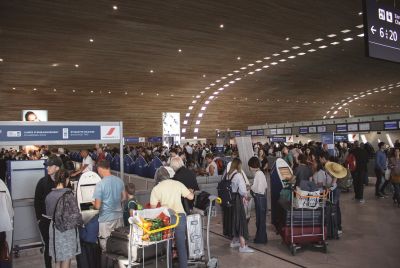Can AI help plan your perfect holiday?
AI is now entering the holiday market, and software company Craft explains how it can help customers create their perfect spring break vacation.

The software company Craft has explained how AI could be the future of holiday planning for any occasion – at any time of the year.
Within the last couple of years, AI's evolution has been massive and it has invited itself into several aspects of people's lives. We now rely on our phones to inform us about the weather, our itinerary or even the best places to have lunch and general knowledge facts.
The use and need for AI are growing in parallel with the advancement in technology. Western society has seen people require and demand its assistance in several of their daily tasks. Whether it is for work or our personal lives, we find ourselves using our smartphones, and evidently AI, more often than we would expect.
According to a poll conducted by Hotels.com, the average person spends more than 10 hours planning a vacation. What if this AI organisational pattern could be extended to our holiday planning and remove the yearly burden and stress of picking and organising?
The research survey led by Hotels.com in 2019 asked 7800 tourists across 26 countries about destination choice and planning.
The results saw 20 per cent declare that they looked through more than 11 travel options and 91 per cent of them insisted on reading the reviews beforehand judging it to be essential. Social media platforms such as WhatsApp, Facebook or Messenger have integrated chatbots which can help create accurate itineraries and select the best destination for you.
One of the Craft's spokespersons stated: "AI technology is changing the way we live our lives – and plan our holidays. From providing tailored recommendations to finding the best deals and routes, you can plan the perfect holiday easier and more efficiently than ever before."
Furthermore, with the introduction of new intelligent technologies such as ChatGPT, Iplan AI or Travel Planner AI, people can plan and put together any type of project that only takes up a few minutes and to some degree is perfectly tailored to the customer's needs and desires.
Craft points out that AI can be used in a similar fashion, suggesting that the biggest perks when using AI to plan out holidays are that you avoid any costly travel agency services and you get a fully customised experience in just a few minutes.
Craft insists, whether people are looking for a gourmet experience or a thrilling adventure, they will get the perfect experience out of planning with an AI assistant.
Online assistants such as Travel Planner AI offer online quizzes designed to create the perfect holiday plan for people – from their mode of transport to their hotel and even the activities they participate in during their vacation.
However, the thrilling experience of planning and organising a trip can also come with costly expenses and it is best to keep track of your spending before relaxing on holidays.
AI budgeting tools offer great insights into the best deals and most appropriate budget options for your travels based on your spending habits. There is also the option of setting up a reminder via your AI assistant to stay focused on your expenses at all times during your journey. You can also receive alerts when you're close to your budget limit.
To more appropriately manage one's finances, the software company points out that people could use online tools such as Cleo or Mint which are very easy to use to start with.
Finally, when the basics of your trips are set up, you can start looking for the best deals and compare prices, especially regarding flight tickets.
As it can be confusing when comparing flights or hotel prices, Craft suggested some tools such as Hopper, which offers personalised recommendations about the best booking time for cheaper options and alternative travel offers as well.
With the automated pricing feature, customers are notified when the prices drop or increase and can make better and more informed decisions based on those fluctuations.
© Copyright IBTimes 2025. All rights reserved.





















